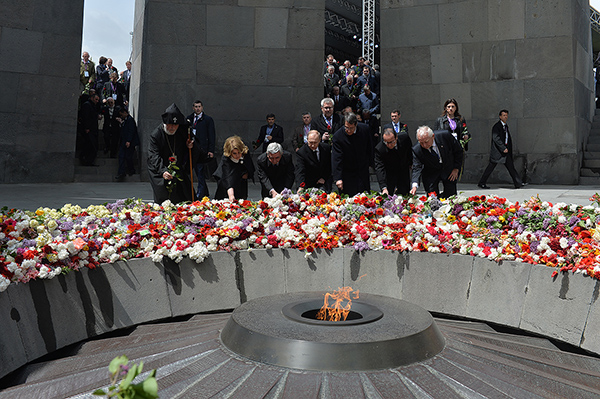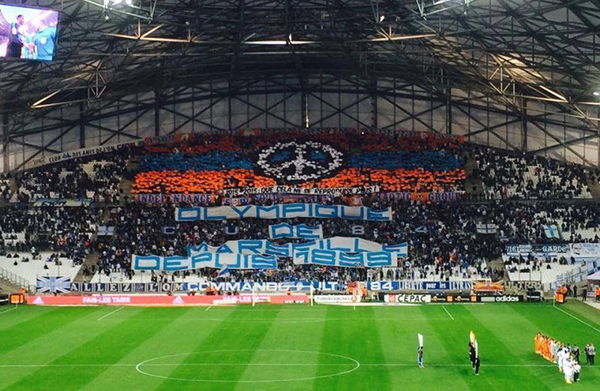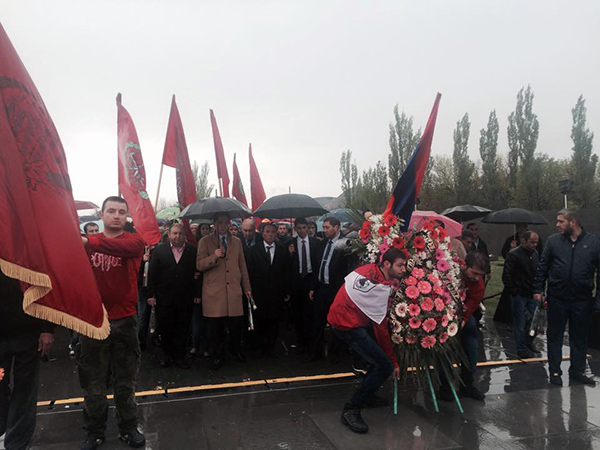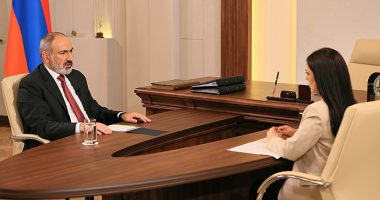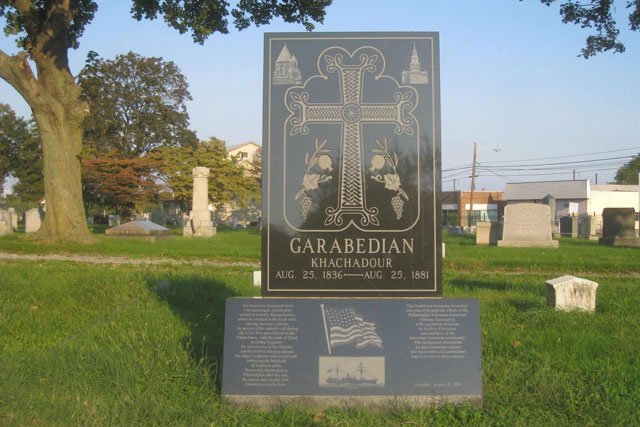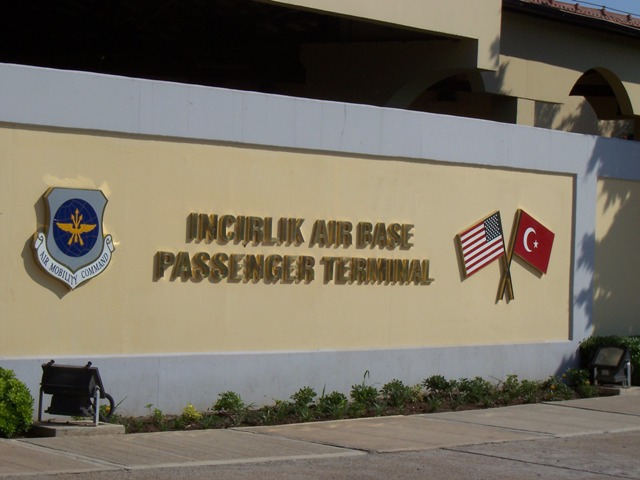YEREVAN — Tens of thousands of people marched to the Tsitsernakabert memorial in Yerevan on Friday to pay their respects to some 1.5 million Armenians who were massacred by the Ottoman Turks 100 years ago in the first genocide of the 20th century.
In what has been an annual ritual in Armenia for almost 50 years, they laid flowers by the hilltop memorial’s eternal fire surrounded by 12 inward-bending columns symbolizing Armenian-populated provinces of the Ottoman Empire.
The daylong procession began amid heavy rain after an official ceremony during which Armenia’s political and spiritual leaders as well as dozens of foreign dignitaries marked the 100th anniversary of the start of the genocide.
The heads of the visiting delegations walked to the memorial one by one, escorted by Armenian schoolgirls holding the national flags of their respective countries. Each foreign leader then put a yellow rose into a wreath shaped as a forget-me-not flower, the official emblem of the commemorations of the genocide centennial.
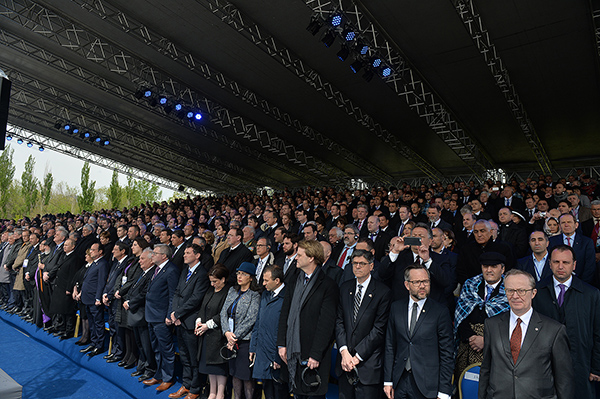

“Human language is powerless to describe what an entire people endured,” he said. “Around 1.5 million human beings were slaughtered merely for being Armenian.”
In his speech, Sarkisian similarly denounced Turkey’s continuing claims that Ottoman Armenians died in smaller numbers and not as a result of a premeditated government policy. “As Pope Francis rightly pointed out [on April 12,] ‘Concealing or denying evil is like allowing a wound to keep bleeding without bandaging it,’” he said.
Sarkisian went on to thank foreign nations and various international bodies that have officially recognized the Armenian massacres as genocide. “Recognition of the genocide is a victory of human conscience and justice over intolerance and hatred,” he said.
The Armenian leader further praised scores of Turks who were due to gather in Istanbul later in the day to commemorate the genocide victims. “They are strong people who are doing the right thing for their homeland,” he said.
The 3-hour ceremony also involved speeches by the visiting presidents of Cyprus, France, Russia and Serbia and a prayer service led by Catholicos Karegin II, the supreme head of the Armenian Apostolic Church.
“I bow to the memory of the victims and I have just told my Armenian friends that we will never forget the tragedies that your people went through,” Hollande told the several hundred participants of the event.
“One hundred years ago, destructive hatred wanted to exterminate a population because it was Armenian,” he said. “This hatred committed considerable massacres but it could not achieve its ultimate end. You are standing there, alive. Armenia bears a remarkable memory, but its message is universal, it is one of resistance, it is one of recognition, it is one of hope.”
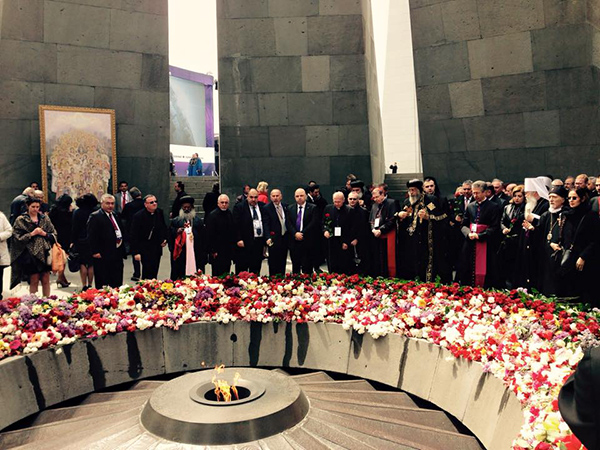

Putin, meanwhile, described the 1915 slaughter as “one of the most appalling tragedies in the history of humankind.” “The events of 1915 shocked the entire world and were perceived in Russia as its own calamity,” he said in his speech.
“And today we mourn together with the Armenian people,” added Putin. “Remembrance events will take place in hundreds of Russian cities — I want to stress that, dear friends: in hundreds of Russian cities.”
Both Putin and Hollande emphasized the fact that the Russian Empire, France and Britain jointly condemned the mass killings and deportations of Armenians as a “crime against humanity” in May 1915, one month after they were ordered by the rulers of the Ottoman Empire.
The official ceremony ended with an address by Esther Mujawayo, a prominent survivor of the 1994 genocide in Rwanda.
“It is very important that we stand by our Armenian sisters and brothers sharing their pain, their struggle, and of course their rebirth,” Mujawayo told the participants of the event.
“As one of the participants of the Global Forum Against the Crime of Genocide, held in Yerevan over the last two days, I would like to extend our gratitude to the government and people of Armenia for furthering prevention agenda and raising public awareness to combat the crime of genocide and reach the noble goal of its complete exclusion,” she added.
Mujawayo also read out the forum’s concluding declaration that calls on the outside world to ensure a greater international recognition of the Armenia genocide and condemns its denial by Turkey. The declaration also calls for a worldwide “strengthening of genocide prevention mechanisms.”

